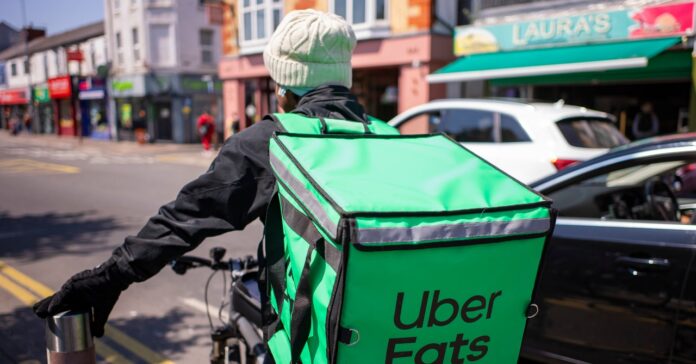Platform workers can no longer be fired automatically by algorithms, according to new European Union rules agreed today in a sweeping reform of the gig economy that will affect Uber drivers and Deliveroo couriers.
“Now we have a proper system, which is something that doesn’t exist anywhere else around the world,” said Elisabetta Gualmini, an Italian politician who led the negotiations for the European Parliament, in a press conference on Wednesday. She described the new rules as a real improvement in the labor rights for millions of workers.
“We do not want an inhuman labor market,” she said, citing the case of a delivery rider in Italy who was fired last year via an automatic email because he did not complete a delivery. The reason? He had been killed just hours before in a road accident. The platform involved, Glovo, told his family at the time it had been a mistake.
The issue of platform work is an existential issue for Europe, Gualmini said. “We are not against changes in innovation,” she added. “But we think that we have to manage these big transitions and transformations in order to protect workers.”
Negotiators from the EU’s three branches of government—the Council, the Commission, and the Parliament—debated for 11 hours, through Tuesday night, to agree to sweeping reform of the platform economy and the rules governing the EU’s 28 million platform workers, who include taxi drivers and food delivery couriers. The deal is a provisional agreement, which means it still needs to be signed off by European governments and politicians sitting in the European Parliament.
The new rules also attempt to clarify whether platform workers are employees—entitled to sick pay, holiday pay, and pension contributions—or self-employed free agents, who are not.
“If you are completely dependent on an algorithm, a machine, for the organization of work, your breaks, the speed with which you have to deliver things, and your vacations, it is very hard to consider yourself self-employed,” Gualmini said. “So you are a worker, you are an employee, and you deserve to have social rights.”
The platform work directive now states that workers should be legally considered as employees if their relationship with the platform paying them meets two of the following five criteria: if the platform allocates their tasks, restricts working hours, limits their earnings, supervises their performance, or imposes rules about their conduct or appearance.
EU member states may add more criteria to this list, which can be adapted to countries’ existing legislation. The rules are expected to enter into force in two years. The EU is on a lawmaking frenzy before the end of the year and before the start of the 2024 election campaign. Last week, lawmakers agreed on a major set of new rules that will govern the building and use of AI.
Since 2021, negotiations over what the platform work rules should include have been beset by infighting, with trade unionists and labor activists alleging that lobbying by Uber has heavily influenced the debate. Last month, platform workers from different European countries protested outside the European Council building, holding up a banner that read, “Don’t Let Uber Make the Law.”
Uber hopes the directive’s final text, once released, will deliver legal clarity, according to company spokesperson Paolo Ganino. “We remain committed to Europe,” he says. “We’ll keep advocating for a model that gives platform workers what they say they want: independence, benefits, and flexibility.”
The idea that platform workers have to choose between employment benefits and flexibility is a figment of the imagination, Jitse Groen, CEO of Just Eat, told WIRED last month. “Everybody wants to be flexible,” he said. “This is just a false argument.”
Referring to the deal, Groen said on Wednesday: “It’s a good day for workers in the platform sector in Europe.”
This issue of platform workers is expected to become only more important as the labor force grows. By 2025, the EU predicts that more than 40 million of its residents will work for digital platforms, carrying out tasks such as food delivery, taxi driving, babysitting, caring for the elderly, and data entry. If correct, that would mean the number of people in the platform labor force would be bigger than the population of Poland, the EU’s fifth-largest country.
This is a developing story. Please check back for updates.
Source : Wired






